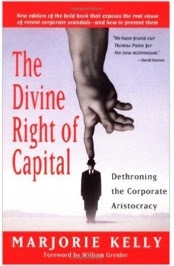by Jim Fetzer
“The proper principle on which societies should be based is that of treating every person as intrinsically valuable and never merely as a means” – Jim Fetzer (following Immanuel Kant)
The Pope has taken the extraordinary measure of castigating capitalism as immoral and exploitative, which may sound shocking to those who are unfamiliar with moral theory. But the Pope is correct, where my purpose here is to explain the philosophical foundations that justify his criticism.
He also condemned Marxism, because of its commitment to materialism and denial of a non-physical world. Capitalism, with its emphasis upon material possessions and physical comfort as transcending spiritual values, represents a different kind of materialism.
Corporations are the problem. Enron, for example, deceived the world by telescoping profits and treating expected future income as though it were already on hand and in the bank.
“W” replicated its conduct by telling us that we had three trillion in surpluses, where we could afford to give a trillion in tax breaks to the rich and still have a trillion for Social Security and another trillion for everything else. It sounded too good to be true because it was.
Bill Clinton had changed the nation’s economic course for the better and set us on a trajectory that was projected to yield those trillions in surplus. But they were merely projected and, by cutting a trillion in taxes for the rich, they were guaranteed to never materialize.
Everyone knows Enron was a case of stunning corruption, but fewer understand the even more profound immorality of Burger King’s desire to move its corporate HQ to Canada to save on taxes, which is a perfectly legal course to take.
Milton Friedman’s principle
Milton Friedman enunciated the principle that the only social obligation of corporations is to maximize profits for their stockholders. Since profits are a function of the difference between income and outgo, if the cost of doing business can be minimized, potential profits can be maximized. And since costs derive from those of labor, natural resources, taxes, advertising and marketing, if those can be minimized, then profits can be maximized. The principle implies that actions of those kinds are not optional but obligatory.
Milton Friedman defending greed as a virtue on TV with Phil Donohue
Economists understand the problem but most Americans do not. Making expenses less costly means paying the least wages and benefits, none if you can get away with it, which is why labor unions are so important. If the working man is to avoid becoming a slave to the corporation, he needs the resources to contest decisions management makes about wages, working conditions and hours. WalMart, for example, has become notorious for calling employees back to work after they have clocked out to do more
Exploiting natural resources, especially without paying for them, and not bothering to clean up pollution from the process, moving headquarters off shore or to other locations to minimize taxes, deceptive advertising and the creation of monopolies are all obvious measures that can contribute to the maximization of profits, which is why environmentalism, laws against false advertising and to defeat monopolies are so important to society. They are barriers against the exploitation of the people by the powerful.
It hasn’t worked out very well, alas, where “that giant sucking sound” Ross Perot warned us about from jobs moving south and outsourcing to other countries had taken a massive toll on the United States. I was a huge fan of Bill Clinton until I realized that, like the Bushes before and after him, he had betrayed the American people by promoting the WTO and NAFTA. Our present president is doing more of the same with the Trans-Pacific Partnership, which is going to eviscerate the nation’s wealth even more.
The Divine Right of Capital
These policies have been so effective that the middle class has effectively been gutted, even though most of us do not fully grasp what has happened and why its effects have been so profound. Maximizing profits is good for those who are stockholders, not so good for the rest of us who are not. As Marjorie Kelly, The Divine Right of Capital (2003), has observed, Friedman’s maxim needs reformulation so corporations are entitled to charters only so long as they take the effects of their actions upon the environment and everyone affected into account.
This is analogous to the transition from limited utilitarianism, where right and wrong are calculated on the basis of the benefits that accrue to the group regardless of their consequences for others (which is exemplified by the conduct of the Mafia, the Third Reich and General Motors) to classic utilitarianism, where right and wrong are determined by the net benefits to all the members of society collectively, which moves in the right direction.
But even classic utilitarianism has its limitations. If a slave-based society where, say, 15% of the population were slaves and 85% were masters would produce more happiness, for example, than any other arrangement (because the masters were so much happier that, even when the distress of the slaves was taken into account, there was more happiness than any other arrangement), a slave-based society would be morally preferable.
Since slavery is immoral if any actions are immoral, something has gone wrong, which is the failure to safeguard individual rights. Majority rule without minority rights has been likened to the politics of the mob, which the right wing properly denounces. The problem is that they would displace it not by deontological policies that treat all men and women with respect but the more corrupt practices of limited utilitarianism, which is a move in the wrong direction. Their analysis is correct but not their own solution.
Deontological Moral Theory
The proper principle on which societies should be based is that of treating every person as intrinsically valuable and never merely as a means. The term “merely” is crucial within this context, since we treat one another as means all the time, where employers use their employees as their means to conduct a business and make a profit, while their employees use their employers as their means to derive an income and to make a living. As long as business is conducted with mutual respect, that is not immoral.
Similarly with doctors and patients, teachers and students, lawyers and clients, where the application of the principles of morality to each of these different disciplines yields business ethics, medical ethics, academic ethics, legal ethics and the like. The basic principle of treating others with respect remains the same, but its application to specific domains can take very different forms, as in the case of computer ethics with its technological ramifications, which is why they are so challenging.
And similarly with relations between nations. The United States professes its devotion to democracy and freedom, but it does not hesitate to topple democracies (as in Iran) and install dictators (The Shah) more to its liking, if that is going to increase the profit margin for US corporations. Taxpayers have expended trillions on wars in the Middle East, while select corporations have pocketed record profits. As Smedley Butler observed in his pamphlet, War is a Racket (1935), he had spent his career as a Marine Corps officer using military force to benefit corporations, not to advance freedom and liberty around the world. And the same was true of 9/11.
What has happened to our society appears to be that the rich and powerful are acting in accordance with the principles that define limited utilitarianism rather than those of deontological moral theory. Because the techniques of surveillance and control have become so encompassing and ubiquitous, their capacity to manage society has become enormously great—far more than at any other time in history. Which is only matched by their greed for more and lust for power, which similarly appear to be unbounded.
The vision that drives them looks positively medieval, with themselves safe in their castles (gated communities) surrounded by moats (or other forms of security). The rest of us are toiling in the fields as serfs and vassals, with no rights and very few benefits. And if you think this is a fantasy, just look around you. This is what the United States of American has become today. And, in the absence of equal power to make changes for the good, it is not going to get better but only worse. And we shall reap the consequences.






This comment has been removed by the author.
artikelnya sangat membantu thanks for sharing
kunjungi web kami gan => http://www.vimaxkapsuloriginal.com
I understand what you were getting at. The bottom line is that the "golden rule" needs to be practiced widespread throughout society. Unfortunately, Darwinian thinking is an economic principle even the most devout Christian seems to practice without conscience.
But if Bill was busy importing cocaine and his wife knows Presidential Models are kept under medical supervision so they don't transmit sexual disease and exploits sexually a person who has been subjected to mind control, aren't those somehow crimes? Or you mean that was before he became POTUS?
His name is Deschner. Because the Roman Catholic theoreticians object to materialism in DiaMat does not mean they are not materialists. For example, biologism in case of spiritual abilities.
Did you confront Milton Friedman with your ethical objection, and, if so, how did he respond?
I was addressing his role as president, not as an exemplar of moral virtue, where I am appalled by them both.
Thanks for this, Anonymous. Of course, you are right. It was a lapse on my part. I appreciate the correction.
If you were a Clinton fan, didn't you believe what Cathy O'Brien and Chip Tatum wrote about him and his wife?
Your article is long and complicated, but already its start errs: anybody who is surprised the Jesuit and Pope criticizes Capitalism doesn't know that is not at all new for Roman Catholic "social doctrine". Maybe you are in the dark because you don't live in South America or Europe? For sure you don't consider the practice of the bank and investment policies of that institution. You better speak with persons who know about its finances. To say the Jesuit and infallible Chair criticizes Marxism because it is totalitarian shows you better review its history – try Karlheinz Denscher. The Roman Catholic objection to Dialectical Materialism is because of Materialism, NOT because of totalitarianism. And by the way, you can ve thankful you never suffered as pupil in a Roman Catholic school.